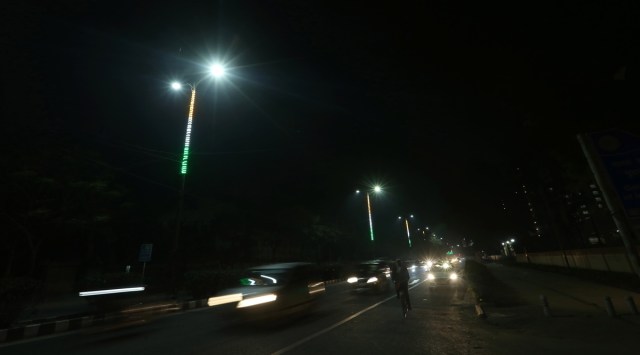Express impact: After series on Delhi’s dark spots, the lights come on
Not only were the lights shut, but bulbs were also missing in many places, with officials saying theft was to blame and promising swift action.
 on DDU MARG
on DDU MARG Prominent roads where street lights were either shut or not working are illuminated once more, after The Indian Express’s four-part series on dark spots in the national capital.
The series followed the death of 20-year-old Anjali Singh, whose body was dragged under a vehicle for several kilometres between Sultanpuri and Kanjhawala. When The Indian Express had retraced the route, it found several areas shrouded in darkness. Over the next week, The Indian Express reported from several other key areas in the national capital – outside the Delhi secretariat; near the AAP and BJP offices; the Dwarka suburb; the students’ hub of North Campus; and various other key stretches that form the lifeline of this city.
 ON Kirpal Singh Marg
ON Kirpal Singh Marg
Not only were the lights shut, but bulbs were also missing in many places, with officials saying theft was to blame and promising swift action.
Roughly a week after the first report appeared, the Delhi government’s Public Works Department has fixed/repaired the lights in several areas — on Kirpal Singh Marg, DDU Marg, Africa Avenue Road (near RK Puram Metro Station) and near Kingsway Camp.
“Street light repairing is a process that goes on all year round because these lights stop working due to various reasons — rain, technical fault or a fuse… Besides, there are theft issues… As soon as we receive a complaint, we repair and fix the lights,” said a senior PWD
official.
Another senior official told this reporter, “Following your observations/complaint and articles, we immediately fixed all the streetlights. Some were done the same day, and the others between 24-48 hours. There are some poles which are yet to be fixed due to technical faults, we are working on it, and those will be fixed in a few days.”
 NEAR KINGSWAY CAMP
NEAR KINGSWAY CAMP
The PWD manages around 1,400 km of arterial roads, flyovers and bridges in the national capital. There are approximately 92,000 streetlights under the department, of which 27,000 are LED lights.
The PWD also has plans to replace all remaining sodium and halogen lights with smart LED ones. These turn on once the sun sets and switch off when the sun rises, and can help the department save around Rs 4 crore per month in electricity bills, the official said.
 NEAR R K PURAM METRO STATION
NEAR R K PURAM METRO STATION
Officials said the department also plans to install sensors in all street poles and geo-tag them with a centralised software to closely monitor and provide better service to the public, especially to ensure there are no dark spots.
“As soon as there is fault or any streetlight stops functioning, the smart sensors will alert the engineer concerned. A control room will also be set up in every division once the project is implemented,” said the official.







